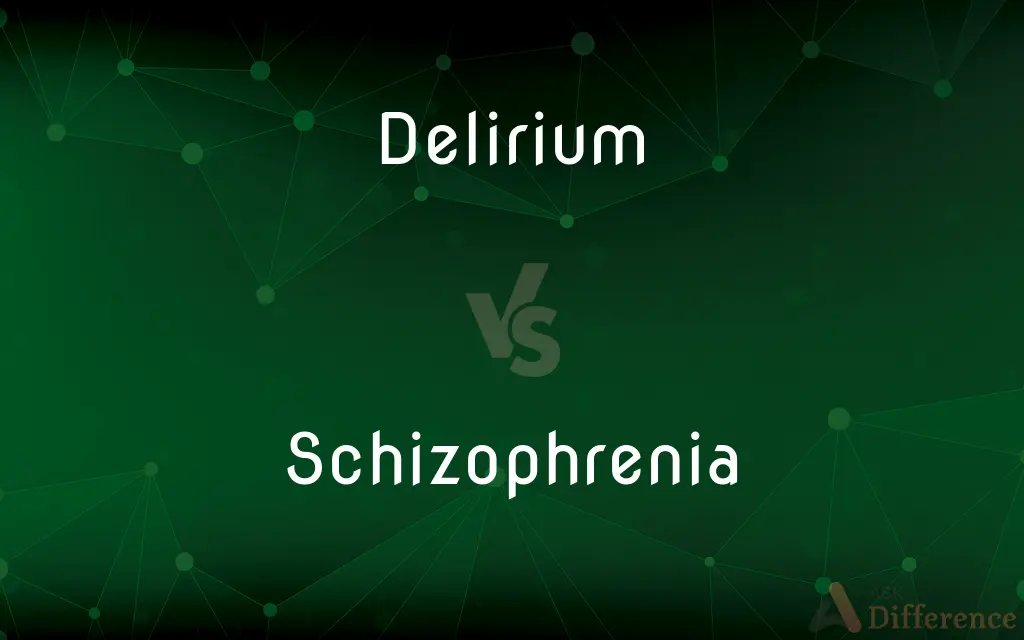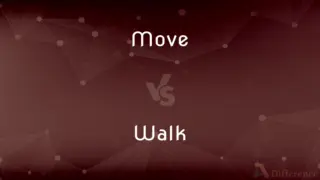Delirium vs. Schizophrenia — What's the Difference?
By Tayyaba Rehman & Maham Liaqat — Updated on April 8, 2024
Delirium is a sudden, often temporary, confusion and change in mental state, while schizophrenia is a long-term mental disorder involving chronic psychosis.

Difference Between Delirium and Schizophrenia
Table of Contents
ADVERTISEMENT
Key Differences
Delirium typically manifests rapidly, usually over hours or days, characterized by fluctuations in consciousness and cognitive impairments. On the other hand, schizophrenia develops more gradually, marked by persistent symptoms like delusions, hallucinations, and disorganized thinking that last for at least six months.
Delirium is often triggered by an acute medical condition, substance intoxication or withdrawal, or medication side effects. Whereas schizophrenia is believed to result from a combination of genetic, brain chemistry, and environmental factors, with no single cause identified.
Patients with delirium experience a disturbance in attention and awareness, making it difficult to focus, sustain, or shift attention. In contrast, individuals with schizophrenia primarily face challenges with thought processes, exhibiting symptoms such as delusions and hallucinations.
The prognosis for delirium can vary; it is generally reversible with treatment of the underlying cause, emphasizing its transient nature. Schizophrenia, however, is a chronic condition requiring long-term management, including medication and therapy, to control symptoms.
Management strategies for delirium involve addressing the causative factors, such as treating infections or adjusting medications. Schizophrenia treatment focuses on antipsychotic medications and psychosocial interventions to improve function and manage symptoms.
ADVERTISEMENT
Comparison Chart
Onset
Sudden, hours to days
Gradual, months to years
Causes
Medical conditions, substances
Genetic, brain chemistry, environmental
Main Symptoms
Confusion, attention deficit
Delusions, hallucinations
Prognosis
Often reversible
Chronic, requires long-term management
Treatment Focus
Underlying cause
Symptom management, therapy
Compare with Definitions
Delirium
Often temporary and reversible.
Once the urinary tract infection was treated, the patient's delirium resolved.
Schizophrenia
Involves chronic delusions and hallucinations.
Despite treatment, she frequently experienced delusions of persecution due to her schizophrenia.
Delirium
A rapid onset of confusion and alteration in mental status.
After surgery, the elderly patient experienced delirium, becoming disoriented and agitated.
Schizophrenia
Requires long-term treatment and management.
Managing schizophrenia involves continuous medication and therapy.
Delirium
Can be caused by various factors, including medications.
The delirium was likely induced by the interaction of new prescriptions.
Schizophrenia
Impacts social and occupational functioning.
Schizophrenia made it challenging for her to maintain employment and relationships.
Delirium
Affects attention and awareness.
He found it difficult to maintain focus on conversations, a common sign of delirium.
Schizophrenia
A mental disorder with symptoms of psychosis.
Diagnosed with schizophrenia, he often heard voices that were not there.
Delirium
Characterized by fluctuations in consciousness.
Throughout the day, her level of alertness varied significantly, indicating delirium.
Schizophrenia
Associated with disorganized thinking and speech.
His speech was incoherent at times, a symptom of schizophrenia.
Delirium
Delirium, also known as acute confusional state, is an organically caused decline from a previous baseline mental functioning, that develops over a short period of time, typically hours to days. Delirium is a syndrome encompassing disturbances in attention, consciousness, and cognition.
Schizophrenia
Schizophrenia is a mental disorder characterized by continuous or relapsing episodes of psychosis. Major symptoms include hallucinations (typically hearing voices), delusions, and disorganized thinking.
Delirium
A temporary state of mental confusion and fluctuating consciousness resulting from high fever, intoxication, shock, or other causes. It is characterized by anxiety, disorientation, hallucinations, delusions, and incoherent speech.
Schizophrenia
(Psychiatry) A heterogeneous psychiatric disorder characterized by psychotic behavior including delusions, hallucinations, withdrawal from reality, and disorganized patterns of thinking and speech.
Delirium
A state of uncontrolled excitement or emotion
Sports fans in delirium after their team's victory.
Schizophrenia
A situation or condition characterized by conflicting qualities, attitudes, or activities
The national schizophrenia that results from carrying out an unpopular war. See Usage Note at schizophrenic.
Delirium
(symptom) A temporary mental state with a sudden onset, usually reversible, including symptoms of confusion, inability to concentrate, disorientation, anxiety, and sometimes hallucinations. Causes can include dehydration, drug intoxication, and severe infection.
Schizophrenia
(pathology) A psychiatric diagnosis denoting a persistent, often chronic, mental illness characterised by abnormal perception, thinking, behavior and emotion, often marked by delusions.
Delirium
Wild, frenzied excitement or ecstasy.
Schizophrenia
Any condition in which disparate or mutually exclusive activities coexist; a lack of decision between options.
Delirium
A state in which the thoughts, expressions, and actions are wild, irregular, and incoherent; mental aberration; a roving or wandering of the mind, - usually dependent on a fever or some other disease, and so distinguished from mania, or madness.
Schizophrenia
Any of several psychotic disorders characterized by distortions of reality and disturbances of thought and language and withdrawal from social contact
Delirium
Strong excitement; wild enthusiasm; madness.
The popular delirium [of the French Revolution] at first caught his enthusiastic mind.
The delirium of the preceding session (of Parliament).
Delirium
State of violent mental agitation
Delirium
A usually brief state of excitement and mental confusion often accompanied by hallucinations
Common Curiosities
Can delirium be cured?
Delirium is usually reversible by treating the underlying cause, making recovery possible with appropriate intervention.
What is delirium?
Delirium is a sudden change in mental state, featuring confusion and decreased awareness and attention.
How does schizophrenia differ from delirium?
Schizophrenia is a chronic mental disorder with symptoms like delusions and hallucinations, unlike the temporary and often reversible nature of delirium.
What causes delirium?
Causes include acute medical conditions, substance use, withdrawal, and side effects of medications.
What treatments are available for schizophrenia?
Treatments include antipsychotic medications and psychosocial interventions.
Can delirium lead to schizophrenia?
Delirium does not lead to schizophrenia; they are distinct conditions with different causes and treatments.
What are the signs of schizophrenia?
Signs include persistent delusions, hallucinations, disorganized speech, and impaired social/occupational functioning.
Can both delirium and schizophrenia be present at the same time?
It's possible for a person with schizophrenia to experience delirium due to an acute medical issue or substance use, but they are treated as separate conditions.
Is schizophrenia a type of delirium?
No, schizophrenia is a separate, long-term mental health condition, not related to the acute, reversible characteristics of delirium.
How is delirium treated?
Treatment focuses on addressing the underlying cause, such as infections or medication adjustments.
How is attention affected in delirium vs. schizophrenia?
Delirium directly affects attention and awareness, while schizophrenia primarily impacts thought processes but can indirectly affect attention through symptoms like disorganized thinking.
Are hallucinations present in both delirium and schizophrenia?
Yes, but the context and persistence differ: they are short-term and fluctuating in delirium, and more persistent in schizophrenia.
What role do environmental factors play in schizophrenia?
Environmental factors, alongside genetics, can contribute to the development of schizophrenia, affecting its onset and course.
Is there a genetic link to schizophrenia?
Yes, genetics, along with environmental factors, can increase the risk of developing schizophrenia.
How does the prognosis of delirium compare to schizophrenia?
Delirium often has a good prognosis with treatment, while schizophrenia requires ongoing management.
Share Your Discovery

Previous Comparison
Pillarbox vs. Letterbox
Next Comparison
Move vs. WalkAuthor Spotlight
Written by
Tayyaba RehmanTayyaba Rehman is a distinguished writer, currently serving as a primary contributor to askdifference.com. As a researcher in semantics and etymology, Tayyaba's passion for the complexity of languages and their distinctions has found a perfect home on the platform. Tayyaba delves into the intricacies of language, distinguishing between commonly confused words and phrases, thereby providing clarity for readers worldwide.
Co-written by
Maham Liaqat















































